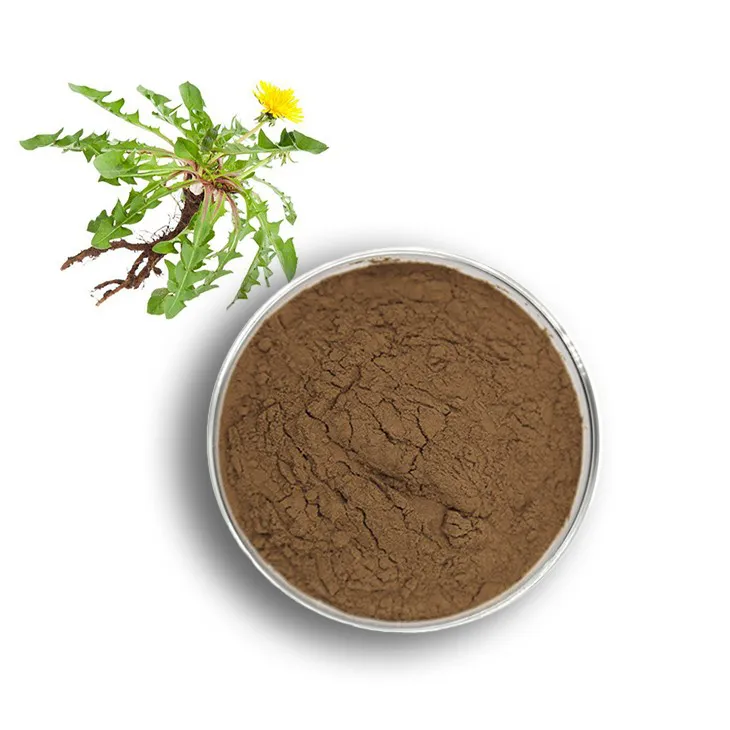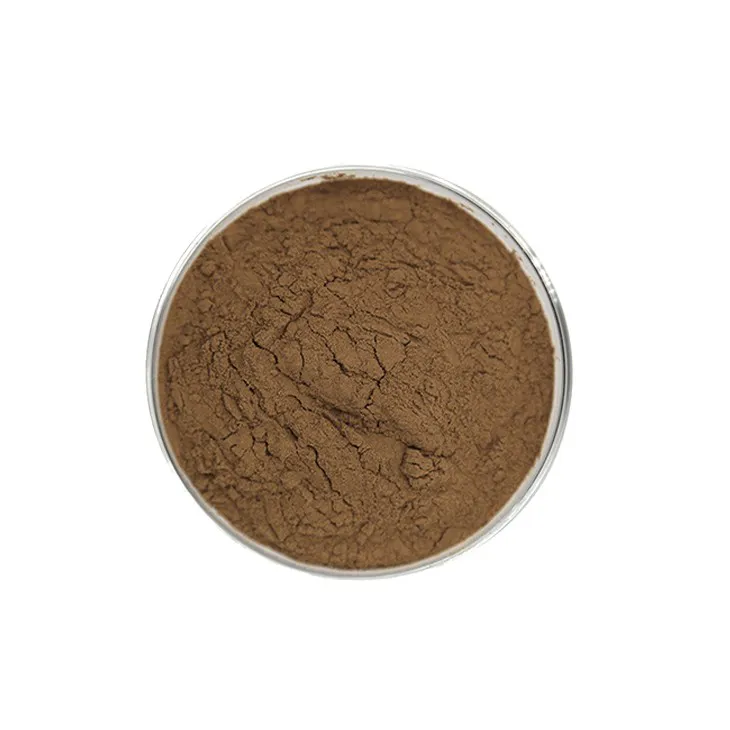- 0086-571-85302990
- sales@greenskybio.com
Benefits of Dandelion Root Extract in Cattle Feed.
2024-11-13

1. Introduction
In the world of livestock farming, especially in cattle rearing, the search for natural and effective feed supplements is an ongoing process. Dandelion Root Extract has emerged as a promising addition to cattle feed. Dandelions are widespread plants that are often considered weeds, but they possess a wealth of beneficial properties that can be harnessed for the betterment of cattle health.

2. Nutritional Composition of Dandelion Root Extract
Dandelion Root Extract is rich in a variety of nutrients that are essential for cattle. It contains:
- Vitamins: Such as vitamin A, which is crucial for good vision, healthy skin, and proper immune function in cattle. Vitamin C is also present, which acts as an antioxidant and helps in collagen synthesis.
- Minerals: It is a source of potassium, which is involved in muscle function and fluid balance. Calcium and phosphorus are also found in dandelion root extract, which are important for bone development and strength in cattle.
- Fiber: The presence of dietary fiber aids in digestion. It helps in maintaining a healthy gut environment by promoting the growth of beneficial gut bacteria.

3. Benefits for Cattle Health
3.1 Digestive Health
The fiber content in dandelion root extract plays a significant role in promoting digestive health in cattle. It adds bulk to the diet, which stimulates the movement of food through the digestive tract. This helps in preventing constipation and other digestive disorders. Additionally, the fiber acts as a prebiotic, providing nourishment for the beneficial bacteria in the gut. These bacteria, in turn, help in breaking down complex nutrients, making them more accessible for absorption by the cattle's body.
3.2 Immune System Boost
The vitamins and minerals present in dandelion root extract contribute to a strengthened immune system in cattle. Vitamin A, for example, is essential for the proper functioning of the immune cells. The antioxidant properties of vitamin C also help in protecting the cells from oxidative stress, which can weaken the immune system. A healthy immune system enables cattle to better resist diseases and infections, reducing the need for antibiotics and other medications.
3.3 Liver Function
Dandelion root extract has been shown to have a positive impact on liver function in cattle. It helps in the detoxification process by promoting the production of bile, which is necessary for the breakdown and excretion of toxins. A well - functioning liver is vital for overall health as it is involved in many metabolic processes, including nutrient metabolism and hormone regulation.

4. Antioxidant Properties
Dandelion root extract is rich in antioxidants, such as flavonoids and phenolic compounds. These antioxidants play a crucial role in protecting the cells of cattle from damage caused by free radicals. Free radicals are unstable molecules that are produced during normal metabolic processes as well as in response to environmental stressors such as pollution and certain toxins. If not neutralized, they can cause oxidative stress, which is associated with various health problems in cattle, including reduced fertility, weakened immune function, and increased susceptibility to diseases.
The antioxidants in dandelion root extract scavenge these free radicals, preventing them from causing harm. This helps in maintaining the integrity of the cells and tissues, promoting overall health and well - being in cattle. For example, in breeding cattle, the antioxidant protection provided by dandelion root extract can contribute to better reproductive performance by protecting the reproductive cells from oxidative damage.
5. Incorporating Dandelion Root Extract into Cattle Feed
5.1 Dosage Considerations
When adding dandelion root extract to cattle feed, it is important to consider the appropriate dosage. The dosage may vary depending on factors such as the age, weight, and health status of the cattle. Generally, it is recommended to start with a small amount and gradually increase the dosage while closely monitoring the cattle for any signs of adverse reactions. For young calves, a lower dosage may be sufficient, while adult cattle may require a higher amount to experience the full benefits.
5.2 Formulation and Compatibility
Dandelion root extract can be incorporated into different types of cattle feed formulations. It can be added to dry feed, such as pellets or hay, or mixed into liquid feed supplements. However, it is important to ensure that the extract is compatible with the other components of the feed. Some ingredients may interact with the dandelion root extract, affecting its efficacy or causing unwanted chemical reactions. Therefore, it is advisable to consult with a veterinarian or a livestock nutritionist when formulating feed with dandelion root extract.
6. Cost - Effectiveness
Dandelion root extract can be a cost - effective supplement for cattle feed. Since dandelions are widespread plants, the cost of obtaining the extract may be relatively low compared to some other commercial feed supplements. Additionally, the potential benefits in terms of improved cattle health can lead to cost savings in the long run. For example, healthier cattle are less likely to require expensive medical treatments for diseases and infections. They also tend to have better growth rates and feed conversion efficiency, which can result in increased productivity and profitability for farmers.
7. Sustainability and Environmental Considerations
Using dandelion root extract in cattle feed also has sustainability and environmental benefits. Dandelions are hardy plants that can grow in a variety of environments, often without the need for extensive agricultural inputs such as fertilizers and pesticides. This makes them a more sustainable source of feed supplement compared to some other plants that require intensive cultivation. Moreover, by incorporating dandelion root extract into cattle feed, farmers can potentially reduce their reliance on imported feed supplements, thereby reducing the carbon footprint associated with transporting these products over long distances.
8. Research and Future Prospects
While there is already evidence of the benefits of dandelion root extract in cattle feed, further research is still needed. More studies could be conducted to determine the optimal dosage for different types of cattle and production systems. Additionally, research could focus on understanding the long - term effects of continuous use of dandelion root extract on cattle health and productivity. There is also potential for exploring new extraction methods to improve the quality and potency of the extract. As the demand for natural and sustainable livestock production methods grows, dandelion root extract has the potential to play an increasingly important role in the future of cattle farming.
9. Conclusion
In conclusion, dandelion root extract offers a range of benefits when incorporated into cattle feed. It promotes digestive health, boosts the immune system, aids liver function, and provides antioxidant protection. It is also cost - effective, sustainable, and has potential for further development. As farmers strive to improve the health and productivity of their cattle while also considering environmental and economic factors, dandelion root extract presents a viable option as a natural feed supplement. However, it is important to ensure proper dosage and formulation through consultation with experts in the field of livestock nutrition. With continued research and proper implementation, dandelion root extract can contribute to a more sustainable and prosperous future for cattle farming.
FAQ:
What are the main benefits of dandelion root extract in cattle feed?
Dandelion root extract in cattle feed has several benefits. It can boost cattle health by providing essential nutrients. It aids in digestion, which is crucial for the proper processing of food and absorption of nutrients in cattle. Additionally, it offers antioxidant properties that help protect the cells of the cattle from oxidative damage.
How does dandelion root extract aid in cattle digestion?
Dandelion root extract contains certain compounds that stimulate the digestive system of cattle. It may enhance the production of digestive enzymes, which break down food more effectively. This helps in better absorption of nutrients from the feed, resulting in improved overall health and growth of the cattle.
Can dandelion root extract replace other supplements in cattle feed?
While dandelion root extract offers many benefits, it may not completely replace all other supplements in cattle feed. Different supplements play different roles in meeting the various nutritional requirements of cattle. However, it can be a valuable addition to the existing feed regime, complementing other supplements and enhancing the overall nutritional profile.
Is dandelion root extract safe for all types of cattle?
In general, dandelion root extract is considered safe for most types of cattle. However, as with any new addition to the feed, it is advisable to start with small amounts and monitor the cattle for any adverse reactions. Some individual animals may have sensitivities or allergies, so proper observation is key.
How should dandelion root extract be added to cattle feed?
The proper way to add dandelion root extract to cattle feed depends on the form of the extract (e.g., powder or liquid). It should be mixed thoroughly with the existing feed to ensure even distribution. The dosage should also be carefully calculated based on the weight and age of the cattle, as well as the specific requirements of the herd.
Related literature
- The Role of Botanical Extracts in Livestock Nutrition"
- "Beneficial Effects of Natural Supplements in Cattle Health"
- "Dandelion Root: A Promising Ingredient for Animal Feed"
- ▶ Hesperidin
- ▶ citrus bioflavonoids
- ▶ plant extract
- ▶ lycopene
- ▶ Diosmin
- ▶ Grape seed extract
- ▶ Sea buckthorn Juice Powder
- ▶ Beetroot powder
- ▶ Hops Extract
- ▶ Artichoke Extract
- ▶ Reishi mushroom extract
- ▶ Astaxanthin
- ▶ Green Tea Extract
- ▶ Curcumin Extract
- ▶ Horse Chestnut Extract
- ▶ Other Problems
- ▶ Boswellia Serrata Extract
- ▶ Resveratrol Extract
- ▶ Marigold Extract
- ▶ Grape Leaf Extract
- ▶ blog3
- ▶ blog4
- ▶ blog5
-
Organic Tongkat Ali extract powder factory.
2024-11-13
-
How to make powder with ashwagandha extract.
2024-11-13
-
Rosehip extract manufacturers from China.
2024-11-13
-
The best cat's claw extract in nature.
2024-11-13
-
Chinese Dandelion Leaf Extract Suppliers.
2024-11-13
-
Green coffee bean Extract
2024-11-13
-
Lemon Balm Extract
2024-11-13
-
Black Pepper Extract
2024-11-13
-
Curcumin
2024-11-13
-
Genistein
2024-11-13
-
Feverfew Extract
2024-11-13
-
Gynostemma pentaphyllum extract
2024-11-13
-
Maca Extract
2024-11-13
-
Thunder God Vine Extract
2024-11-13
-
Reishi mushroom extract
2024-11-13





















